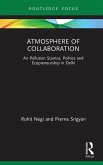Shifts the conversation from abstract "global warming" to the deeply human impacts of heat-and how our efforts to keep cool have made the problem worse. Despite the flames of record-breaking temperatures licking at our feet, most people fail to fully grasp the gravity of environmental overheating. What acquired habits and conveniences allow us to turn a blind eye with an air of detachment? Using examples from the hottest places on earth, Heat, a History shows how scientific methods of accounting for heat and modern forms of acclimatization have desensitized us to climate change. Ubiquitous air conditioning, shifts in urban planning, and changes in mobility have served as temporary remedies for escaping the heat in hotspots such as the twentieth-century Middle East. However, all of these measures have ultimately fueled not only greenhouse gas emissions but also a collective myopia regarding the impact of rising temperatures. Identifying the scientific, economic, and cultural forces that have numbed our responses, this book charts a way out of short-term thinking and towards meaningful action.
Dieser Download kann aus rechtlichen Gründen nur mit Rechnungsadresse in A, D ausgeliefert werden.









